Why did Cui Tiankai's eight-year former white diplomatic veteran in the United States overdue his service?
Among the previous ambassadors to the United States, the one who has been in office for the longest time is about to leave his post and return to China. Since April 2013, Cui Tiankai has been in the position of ambassador to the United States for 8 years. Behind him are Li Daoyu and Zhou Wenzhong, who have been in office for five years.
Cui Tiankai is the tenth Chinese ambassador to the United States. Previously, the new Chinese ambassadors to the United States were: Chai Zemin, Zhang Wenjin, Han Xu, Zhu Qizhen, Li Daoyu, Li Zhaoxing, Yang Jiechi, Zhou Wenzhong, and Zhang Yesui.
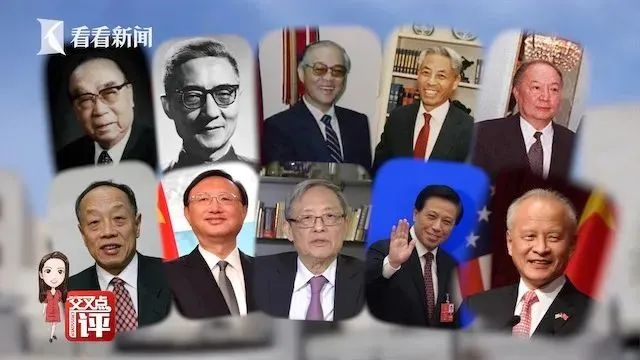
On June 21, the website of the Chinese Embassy in the United States released a farewell letter from Ambassador Cui Tiankai to overseas Chinese in the United States. In the letter, Cui Tiankai said with emotion, "This is the longest term of office in my diplomatic career." If there are no accidents, this will also be the last time this old man in his seventies will work abroad.
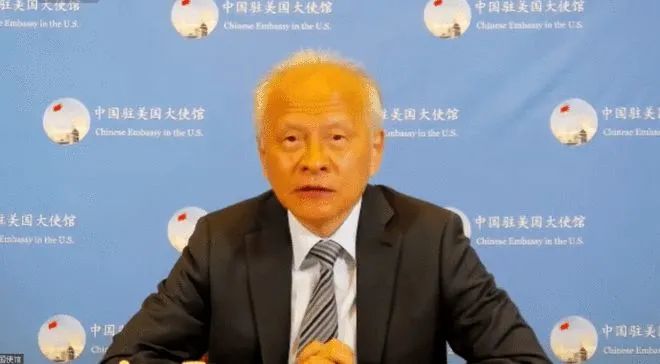
The eight years from 2013 to 2021 are undoubtedly the most turbulent eight years in Sino-US relations since the establishment of diplomatic relations. As the Chinese ambassador to the United States, Cui Tiankai has experienced historical changes in Sino-US relations from good to bad and China’s growing strength in the past eight years.
For this change, he felt more strongly than anyone else. From Obama, to Trump, and then to Biden, after three presidents of the United States, he did his best to maintain the fundamentals of China and the United States. This veteran diplomat, wandering between the top leaders of the two parties in Washington, frequently appeared in the American media, introduced China to the American people, and tried to mend the increasingly broken relationship between the two countries. He is gentle, neither humble nor overbearing, and still maintains the demeanor of China's best diplomat among the wolves.
This year Cui Tiankai is 69 years old and has already passed the retirement age of 63 for a deputy ministerial official. The reason for the overdue service is obviously a rare talent. In the post of ambassador to the United States, it is impossible to have a vegetarian meal. Without outstanding ability, Americans cannot be convinced, nor can they be assured of high-level management. In the current system, it is difficult to find a candidate with equal qualifications and abilities. In the complex relationship of Sino-U.S. cooperation and struggle, Cui Tiankai helped the ship of Sino-U.S. relations navigate through stormy seas with skill and strong connections.
Cui Tiankai, who is now gray-haired, was once a handsome boy. He was trained according to the standards of a diplomat since he was a child.
Cui Tiankai was born in Shanghai in 1952. At the age of 13, he was admitted to the High School Affiliated to Shanghai International Studies University. This middle school has a great background and is known as "the cradle of new Chinese diplomats and foreign language talents." The students who come in are all selected from a thousand miles away. This shows that Cui Tiankai was excellent in his youth.
In the early 1960s, there was an urgent shortage of high-level foreign language talents in my country. In order to solve this problem, Zhou Enlai and Chen Yi demanded that "learning foreign languages should start from the baby", and advocated the training of foreign language talents from elementary school to university. In 1959, Beijing took the lead in establishing the affiliated high school of Beijing Foreign Studies University. Four years later, it established a foreign language school in Shanghai, Guangzhou, Chongqing, Changchun, Xi'an and other places. Yang Jiechi and Wang Guangya are the founding students. They are two years earlier than Cui Tiankai, but they have both lived in the same dormitory. Regarding whether the three are in the same class, Dongfang Weekly has another statement-"According to the memory of the class teacher at the time, Cui Tiankai's classmates included 8 diplomats. Among them were State Councilor and former Foreign Minister Yang Jiechi, and former Vice Minister of Foreign Affairs Wang Guangya, etc. People. The three live in the same dormitory, and Wang Guangya and Yang Jiechi live in the upper and lower bunks." Cui Tiankai is two years younger than Yang Jiechi and Wang Guangya, so it is most likely that he is a senior student.
In November 2009, when Yang Jiechi, a 1966 alumnus of Shanghai Foreign Affairs University and then Minister of Foreign Affairs, returned to his alma mater to visit teachers and students, he said: “Today, there are 127 graduates of Shanghai Foreign Affairs Ministry working in the Ministry of Foreign Affairs.”
In March 1969, 17-year-old Cui Tiankai came to Aihui County, Heihe District, Heilongjiang Province as an educated youth. In the rural areas of the Great Northern Wilderness, he has grown barley and adzuki beans for more than 5 years. From 1968 to 1977, Beidahuang admitted more than 80,000 educated youth from Beijing and more than 110,000 educated youth from Shanghai. Cui Tiankai's Heihe "wild friends" include Wang Yi, Wang Yong, Jiang Daming, Nie Weiping, Liang Xiaosheng, Jiang Kun, Pu Cunxin and other well-known figures.
In 1974, Cui Tiankai ended his career as an educated youth. As a worker, peasant and soldier student, he entered the English major of the Department of Foreign Languages of Shanghai Normal University, and then stayed on to teach and study for graduate students.
In the early 1980s, as the first generation of simultaneous interpreters in New China, Cui Tiankai successfully graduated from the first UN interpreter training course at Beijing Foreign Studies University and came to the Chinese Department of the Conference Services Department of the Secretariat of the United Nations Headquarters to work as an interpreter. The starting point of diplomacy.
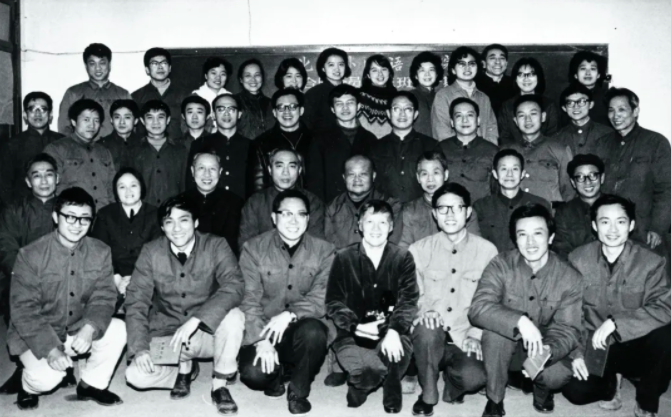
Group photo of graduation of the first UN translation training class in 1981. Cui Tiankai is the sixth from right in the third row.
In 2020, Cui Tiankai told former US Treasury Secretary Paulson that he has always been interested in international issues, the world situation and related issues. Go to the United Nations translator training course, "more or less related to curiosity."
At that time, the Chinese Section of the United Nations Translation Department occupies the entire 23rd floor of the United Nations Headquarters in New York. Cui Tiankai and He Yafei, who later became the deputy director of the Overseas Chinese Affairs Office, were two young translators in this "China Town". He Yafei has a fast translation speed and is called "Kai Shou", while Cui Tiankai is good at scrutinizing words and sentences, and both of them write very well . In April of this year, when Yang Xiong, the former mayor of Shanghai, passed away, Cui Tiankai sent a letter of condolences. It was indeed a good word, which was impressive.
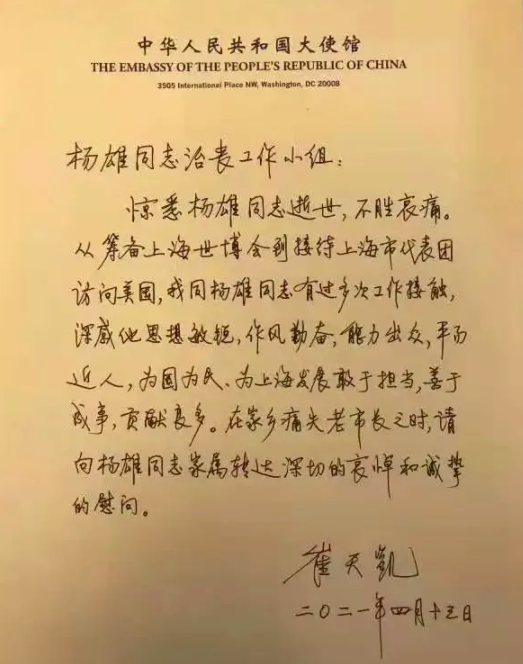
Working at the United Nations, Cui Tiankai's monthly salary starts at US$3,000. If this kind of income were placed in the country at that time, it would be unimaginable. However, all wages must be handed over to the embassy, and each person can only receive a few dozen dollars a month as a "installation fee".
They live in the Chinese Consulate in New York, each with a single room with a separate bathroom. Breakfast and dinner are usually eaten at the consulate, and lunch is eaten with Chinese and foreign colleagues in the restaurant of the United Nations building. Reimbursement can be made to the consulate.
After three years in New York, since 1984, Cui Tiankai, who has excellent quality in all aspects, entered the Ministry of Foreign Affairs and started a diplomatic career for 37 years. He has served as a spokesperson for the Ministry of Foreign Affairs, Minister Counselor of the Permanent Mission to the United Nations, Asia Director of the Department, Ambassador to Japan, Deputy Minister of Foreign Affairs and many other important positions. He is also the only Chinese diplomat who has served as both the ambassador to Japan and the ambassador to the United States. From 1986 to 1987, Cui Tiankai also studied in the United States, attended the Advanced Institute of International Studies at Johns Hopkins University, and obtained a master's degree in international public policy. During this year, Cui Tiankai had close contact with the American people and society and learned some economics courses, which was very beneficial to his entire diplomatic career.
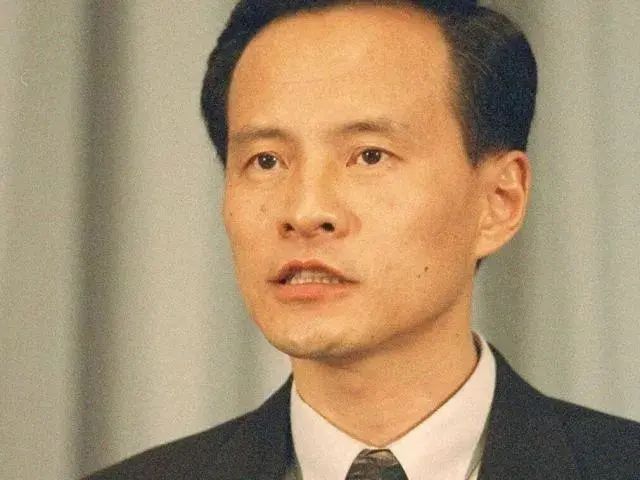
Cui Tiankai once summed up these experiences, "Being an educated youth, came to the United States to study for a few days, and both local and foreign jumps in the queue."
People in the Ministry of Foreign Affairs love to get married within this system, which is also related to the nature of diplomatic work. For example, the father-in-law of former Vice Foreign Minister Wang Guangya is Chen Yi; the father-in-law of former Foreign Minister Li Zhaoxing is the old diplomat Qin Lizhen; and the father-in-law of former Deputy Foreign Minister Dai Bingguo is Huang Zhen. However, Cui Tiankai's family rarely sees media reports.
Cui Tiankai is very low-key. It is said that he sometimes goes to meetings at the Ministry of Foreign Affairs and the armed police on guard do not recognize him.
In 2011, the then U.S. ambassador to China, Gary Locke, came to Beijing and received a lot of praise for taking the economy class. At the National Congress of the People's Republic of China in 2013, Cui Tiankai said when answering a reporter's question that Locke has elements of showcasing, but diplomats' "showing" is not useless. "I told Locke face to face that I have been to Starbucks countless times and spent my own money, and I will also take pictures on the Internet in the future. I know all the fast food restaurants around the Ministry of Foreign Affairs . I have eaten many times at each of them. Money, work overtime to eat fast food, but I didn’t say it on the Internet. Some of his (Jiahui Locke)'s tricks are not for us to consider. The Chinese diplomat in the United States also pays attention to conservation and environmental protection and has done a lot of good things. We I think it should be. In fact, sometimes in order for everyone to do good deeds and have more influence, we can publicize it. "
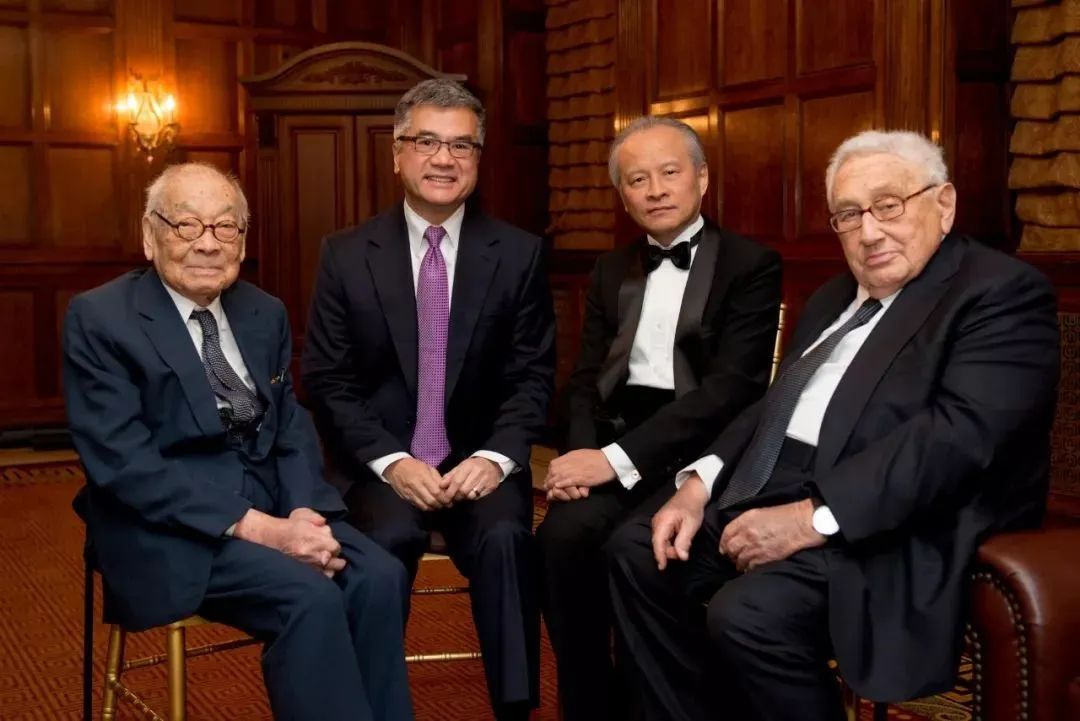
Because of his understanding of the United States and his outstanding performance in various positions, Cui Tiankai became the tenth ambassador to the United States. Immediately before going to the United States, he said in an interview with the Southern Metropolis Daily that after he went to the United States, he should see the media more and have extensive contacts with all walks of life, "As long as you have time, you will have more contacts with them." Specifically, "When you arrive in the U.S., the first thing is to'familiarize yourself'. Or else people don’t even know your ambassador, how can you get to know your country. Besides, what does the country send you to do? It is to meet people and meet face-to-face. Otherwise, you can see it on TV or the Internet, and you can do it in China."
He even said that social media such as Facebook may be used to get closer to the American people. "When I arrive in the United States, I will think about it, but I dare not use it at home. One is that I don’t have time, and the other is that (my) identity will cause a lot of things. Is it representative of yourself or the Ministry of Foreign Affairs? When I go to the United States, I will consider using it. It may be easier to contact people."
In the eight years in the United States, Cui Tiankai said in his farewell letter, "Leave a lot of unforgettable memories for life." In fact, his personal charm has made many people unforgettable for life.
A reporter from "China Daily" once wrote that Ambassador Cui is good at using short sentences in English when speaking and writing articles, and he is good at using American elements to talk about Chinese topics.
Former U.S. Assistant Secretary of State Campbell once commented that Cui Tiankai is always unique: "He is very particular about strategy, always able to come up with solutions, and never panic."
After serving as the Deputy Minister of Foreign Affairs in 2010, Cui Tiankai was in charge of the Americas and Oceania, frequently traveling to and from the Pacific Ocean. In 2010, Campbell held an event on his farm and invited Cui Tiankai, the then Deputy Foreign Minister who was visiting the United States, to attend. On the same day, Campbell learned from other sources that Cui Tiankai had "goed to the mountains to the countryside" and drove a tractor. So he drove out his old-fashioned tractor, "asked me if I could drive, I drove him a circle and cut a circle of grass. Both of us were very happy and took pictures in front of the tractor." Later, When Cui Tiankai visited the United States again, he gave Campbell a model of a Chinese "Dongfanghong" tractor as a gift.
In 2018, Sino-US trade frictions intensified. In April of that year, Cui Tiankai was invited to visit Harvard University. In his speech, he said: “Since I first set foot on the land of the United States in 1981, I have lived in the United States for 11 years as an international student, UN staff and diplomat. ... But recently, I have begun to feel confused. I asked myself, is the United States now still the open, confident, and optimistic United States I used to know? I couldn’t find the answer in Washington, so today I came to Harvard University, I believe You will give me an answer."
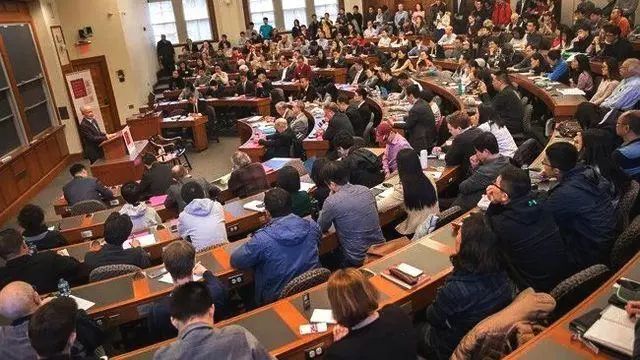
The changes in the United States made Cui Tiankai very confused. Whether he found the answer at Harvard University, the media did not report.
Because he is too familiar with the United States, Cui Tiankai has called on China and the United States not to engage in confrontation on various occasions.
On April 20, 2013, Cui Tiankai had a speech shortly after he took office in the United States, “ In terms of diplomacy, the best thing to do is Sino-US relations. If Sino-US relations are stable, the overall diplomatic situation will be stable; the overall diplomatic situation will be stable. Therefore, China’s strategic opportunity period will be greatly guaranteed, and it will be more likely and more conditions to achieve the "two centenary" goals. Therefore, China-US relations have always been a foreign relationship that we pay great attention to and have invested heavily in. "
This year marks the 50th anniversary of China-US "Ping Pong Diplomacy". On April 10, Cui Tiankai pointed out in an opening speech at an event that the Sino-US confrontation is definitely a disaster for the two countries and the world. He said that the ping-pong diplomacy 50 years ago was of special significance in the history of Sino-US relations. It creatively opened up a unique way of communication for the people of the two countries separated for decades, and sent a signal to the two countries and the world to improve Sino-US relations, thus unveiling a series of major events from President Nixon’s visit to China to the establishment of diplomatic relations between China and the United States. The prologue. " We want to pay tribute to the extraordinary strategic vision and superb diplomatic art of the older generation of leaders of China and the United States, and also express our sincere gratitude to all those who have participated in this history. "
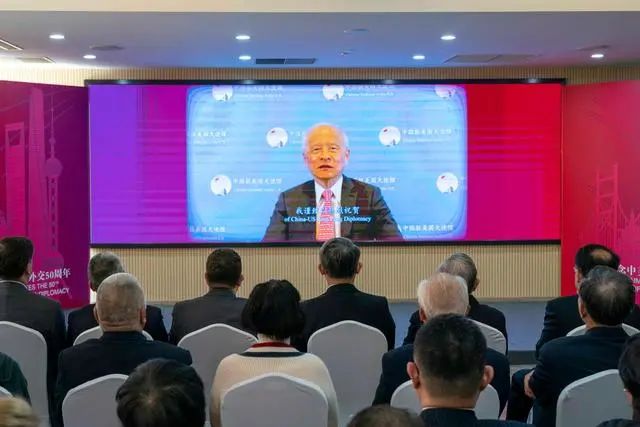
The New York Times once stated that Cui Tiankai is the Chinese diplomat who knows the United States best. He has competed with American diplomats at numerous international conferences, and he has always been able to eliminate differences .
It is true. Cui Tiankai has been in the United States for eight years, and time can best prove the effectiveness of his work. China needs him, and Sino-US relations need him.
As usual, ambassadors to the United States are served by the current Deputy Foreign Minister. Cui Tiankai's successor, if nothing happens, will come from the current deputy ministers.
No matter who the successor is, it is impossible to stay as ambassador to the United States for another eight years. Cui Tiankai is unique.
It is worth noting that since October last year, the US ambassador to China has been absent. After Biden took office, he has successively appointed seven new ambassadors abroad, but he has not yet confirmed the candidate for the ambassador to China. There was no ambassador to China for more than half a year. This is unprecedented in Sino-US relations for more than 40 years. The United States did not appoint a new ambassador for a long time, and Cui Tiankai served over the period. China has not yet announced a new ambassador to the United States. This situation is actually a portrayal of the actual relationship between the two parties.
No matter how complicated the Sino-US relationship is, it is impossible for a 69-year-old man to continue indefinitely. From green silk to white hair, Cui Tiankai dedicated his life to Chinese diplomacy. Now, he can go back to Shanghai and have a happy conversation with Zhang Wenhong.
At the end of March last year, Cui Tiankai wrote a handwritten letter to Professor Zhang Wenhong, director of the Department of Infectious Diseases at Huashan Hospital, Fudan University, thanking him for spreading knowledge about the epidemic to overseas Chinese on the Internet.
A high-ranking deputy ministerial official’s respect and admiration for a doctor is one of his handwritten letters, which can also reflect his old-school intellectual style is the paragraph at the end of the article- "After the epidemic is over, try to get a chance. Go home and have a look. I hope to visit you at that time, not to see a doctor, but to ask for advice." Like neighbors gossiping, it is both gentle and courteous.
Zhang Wenhong wrote in his reply: "When the world wins the fight against the epidemic, please be sure to go back to your hometown, and we will have a good drink in the tavern."
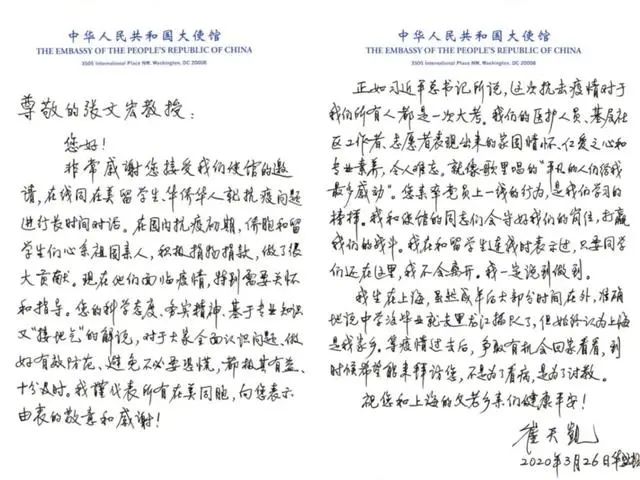
One day, in a small tavern in Shanghai, you might be able to see Cui Tiankai and Zhang Wenhong having a very happy conversation.

COMMENTS